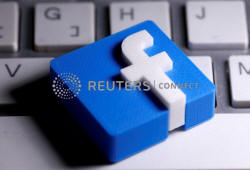Facebook election plan patches some holes, creates
others
 Send a link to a friend
Send a link to a friend
 [September 04, 2020] By
Katie Paul and Elizabeth Culliford [September 04, 2020] By
Katie Paul and Elizabeth Culliford
SAN FRANCISCO (Reuters) - Facebook Inc's <FB.O>
final policy changes in the lead-up to U.S. elections in November are
unlikely to stem a flood of disinformation around the vote, which could
suppress turnout and sow confusion about results, election experts said
on Friday.
Restrictions on paid messaging were a net positive, experts said, but
warned such moves did little to address the biggest threat: the organic
spread of falsehoods. Some said the new rules may even make it harder
for campaigns and election officials to counteract bogus claims in
crunch time.
Chief executive Mark Zuckerberg announced on Thursday that Facebook
would stop accepting new political ads in the week before the U.S.
elections on Nov. 3, and pointed to a series of new tools such as labels
for posts claiming victory before the results are official or
delegitimizing the outcome.
The company billed the announcement as its final plan for reducing the
risks of misinformation and election interference.
Banning new ads suggests Facebook executives realized they would not
have time to identify and act on content that violates their rules in
the last days before the vote, said Vanita Gupta, CEO of the Leadership
Conference on Civil and Human Rights.

The limits are "an acknowledgement of the fact that they don't always
move quickly enough" to catch viral problems, said Gupta, who has
advised Facebook on election preparations along with other civil society
leaders.
Eric Wilson, a Republican digital strategist, said Facebook's failure to
catch a militia group organizing on its platform around Kenosha,
Wisconsin, last week - despite users flagging the material 455 times, as
BuzzFeed reported
https://www.buzzfeednews.com/
article/ryanmac/facebook-failed-kenosha - cast doubt on its ability to
moderate election-related content.
"Let's just look at their track record," he said. "What makes us think
that Facebook's going to be on top of this in front of one of the most
hotly contested elections in recent memory?"
LOOPHOLES AND RESTRICTIONS
Researchers had higher praise for the company's moves to elevate
authoritative sources of information through its Voting Information
Center and notifications that would appear at the top of users' news
feeds.
The tools will point users to live election results data provided by
Reuters and the National Election Pool, Facebook said.
[to top of second column] |

A 3D-printed Facebook logo is seen placed on a keyboard in this
illustration taken March 25, 2020. REUTERS/Dado Ruvic/Illustration/File
Photo

But some election officials voiced frustration that political advertising
restrictions would also be applied to them, especially in the critical final
week.
In Connecticut, a tropical storm knocked out power and cable for much of the
state days before the primary this year, prompting new emergency guidance on how
to vote, said Gabe Rosenberg, the secretary of state's communications director.
"I can't pre-do an ad about an emergency," Rosenberg said. "And I can't
understand what they're trying to prevent. We're not doing advocacy – it's just
how you vote, from the most trusted source of that information."
Two groups representing election officials, the National Association of
Secretaries of State and the National Association of State Election Directors,
said they are seeking clarity from Facebook on whether officials would be
granted an exemption to run ads about voting protocols in the final week.
They are also pressing the company on whether it would tell users that results
from Reuters were "official," even though counting ballots can often take weeks.
A Facebook spokesman told Reuters the ban would apply to all political ads,
including those from election officials.
Others questioned why Facebook would allow advertisers to resume placing ads the
day after the election, given the concerns Zuckerberg articulated about
confusion likely to follow if results are not immediately clear.
Facebook confirmed that was its current plan, but a spokesman said the company
would have "more details to share" on specific day-after scenarios closer to the
election.
Gupta said Facebook was still working out how it would handle that period, even
though Zuckerberg wrote that the changes announced Thursday were the final word.
"This is not the total universe, as I understand it, of what they will do
post-Nov. 3," she said.
(Reporting by Katie Paul and Elizabeth Culliford; Editing by Greg Mitchell and
Gerry Doyle)
[© 2020 Thomson Reuters. All rights
reserved.] Copyright 2020 Reuters. All rights reserved. This material may not be published,
broadcast, rewritten or redistributed.
Thompson Reuters is solely responsible for this content. |